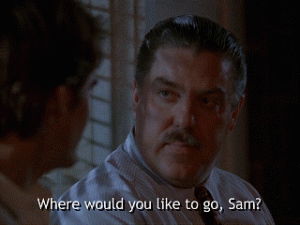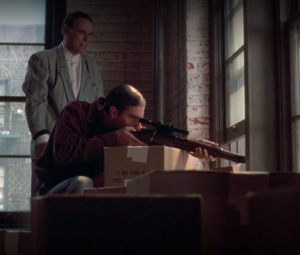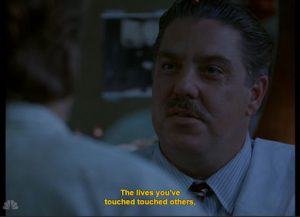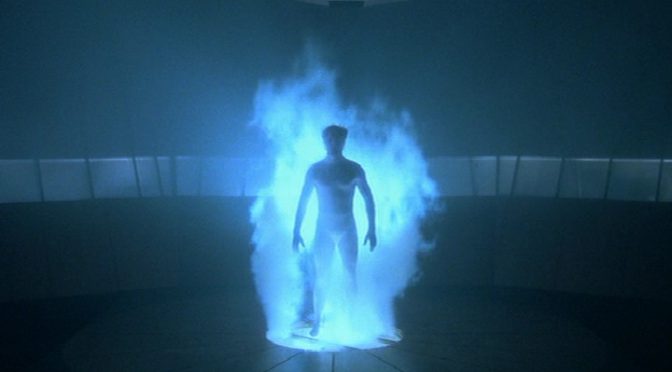As winter fully sets in and we crawl on towards springtime, I find myself reflective every year. In part it’s because my birthday is right in the middle of it, a moment where I have to acknowledge the passage of time and can’t help but take stock. That’s not say it’s a particularly deep time, sometimes those reflections are petty at best, but I can’t help but think about how events have unfolded. And, while not as much personally has changed as I would have liked, I can at least say that I’ve always done my best to grow. I pride myself in keeping an open mind, being willing to hear out other points of view, and change my stance when I’ve seen sufficient evidence I was wrong. In my mind, allowing yourself to change, grow, and find improvements is admirable.

But one thing I’ve learned over the years is that change for the sake of change is often counter-productive. Even with the best of intentions, a lack of a plan or a lack of a reason beyond “it needs to change” will generally lead your efforts down the wrong path. Growth and progress generally require forward motion, where as simple change can be perfectly sideways instead. And the problem with going sideways is that it often isn’t really fixing anything so much as it’s just making it “different”. This applies to all aspects of life: whether it be your personal habits, politics, or even your work.
As writers we have to accept that change is necessary more often than we’d like. Sometimes this is a matter of editing, or the occasional ret-con. These are, while painful, a simple act of identifying the problem and fixing it. But other times there are changes where it’s much harder to identify the next step or the correct course of action. These are a greyer area, somewhere you can actually come away making bigger mistakes. And, because of the risks involved, it’s important that entering these changes requires we have a solid plan of action.
Unfortunately, sometimes, people don’t…
Looking Before You Leap

The reason the topic came to mind is because in the last month I’ve had an opportunity to watch a few things that I normally wouldn’t get around to. With TV in its winter lull and my health doing roughly the same, I suddenly had a chance to binge and catch up on some nostalgia. A lot of it was inconsequential, but a couple of the things I watched made me reflect on the value of having a reasonable strategy behind major changes.
In my elementary days my father was a huge fan of speculative fiction and introduced me to quite a few shows and movies he watched himself. Some, like Star Trek, were things I’d go on watching for the rest of my life with some degree of regularity. But other things we watched back in those days were fairly hard to find until streaming became common. In fact, I hadn’t even thought to look for them until they were suddenly offered to me on my Hulu account. And, because of that, it had been a long time since I’d gotten a chance to sit down and watch one of my old favorites from childhood.
I’m certain most people who would find their way to this blog are familiar with Quantum Leap. Following a time traveler “leaping” from lifetime to lifetime, it was one of those few shining examples of a time travel story that really worked. And the reason why it worked was because it did its best to avoid falling into the old traps of time travel stories. First, while the mechanics of time travel within the story were clearly bullshit, it established rules quickly and stuck with those rules – avoiding constantly contradicting themselves. Second, it avoided becoming convoluted by eschewing complex arcs and focusing on one event at a time. And third, most importantly, it focused on the human element.
Quantum Leap’s stories weren’t about massive, sweeping changes to the timeline. Though many major events in the last half of the 20th century served as backdrops to these stories, it was never about saving the world but instead about saving a life. It wasn’t about trying to stop the Cuban Missile Crisis – it was about helping a family get through it intact. It wasn’t about directing the course of the civil rights and women’s liberation movements but instead about using hindsight to help people successfully navigate complicated, sometimes dangerous times.

And, though the protagonist would never see the true impact of his work, the marks were always there. A group of nuns get the money they need to build a chapel so they can help the poor. A young aspiring doctor would be convinced to follow his dreams and open a clinic in a disadvantaged community. A woman with a jealous and violent ex would survive her ordeal and pass the bar exam – eventually becoming the senator that approved Quantum Leap’s funding. Each of them through a chain of events would change the world in their own ways.
As a result, while the stories were narrow in scope they never felt trivial. It was about people who wouldn’t be considered important enough for the history books but were still important enough to change the world around them – even if only in the smallest of ways. Every episode made sure that you cared about these characters and what could happen to them. And, for the first four seasons, that didn’t require them to be famous figures or tied to major events.
And then the fifth season threw that all out the window.

Having struggled in the ratings and on the verge of being cancelled, the creators behind Quantum Leap started to make drastic changes to their formula in hopes of capturing more attention. They were now dealing with famous figures in major events. The likes of Lee Harvey Oswald, Marilyn Monroe, and Elvis Presley suddenly appeared – Oswald actually getting a two-parter in the process. They broke their own rules, created convoluted multi-episode plot arcs, and introduced elements that made little sense. For a series of episodes there were even evil Leapers, leaping from life to life to put wrong what once went right. Though not a terrible season, it was a season full of acts of desperation and simply wasn’t quite the same anymore. There was no genuine inspiration or plan behind their changes. Instead, in an effort to try to save themselves, they threw every potential idea at the wall and ended up losing what made their show special.
Though some of the episodes in the fifth season still held the charm of the series as a whole, it wasn’t quite what it had been originally. And, despite all of their efforts, it still found itself cancelled. Appropriately, when it reached it’s end it spent the finale reflecting on the meaning of it all and on the true value of Sam Beckett’s travels through time. Most telling of all, when it was time to reference the most important of those travels it wasn’t the famous figures that made an appearance but the regular, everyday sort of people.

Would the show have survived to see a sixth season if they had stayed the course? It would be impossible to know for sure. The show had been struggling and it was on the path to cancellation already. But what would have been certain is that, had they stuck to their guns, the final season could have also been the best. Every season found them increasingly more comfortable with their formula, allowing them to do better work, and the fifth could have continued to do the same. Unfortunately, change was made for the sake of change, and what we got was just “okay” instead.
Really, it happens all the time. Across all forms of media there are sudden executive decisions or panicked reactions that cause people to switch things up without a real plan of action. It may be one of the greatest contributors to surprising disappointments in culture. And, the thing is, everyone is a little to blame for when it happens. While it’s easy to simply blame executive meddling, there have been so many times when audiences and creators have influenced such changes without any need for an out of touch executive.

It was in the middle of Quantum Leap’s fifth season that I realized that even I had cheered for changes in the last couple years which turned out to be somewhat disappointing when they came to pass. And, in all of the cases where that happened it was because there was no real inspiration for the change except for the desire for change itself. In the process of watching things like this come to pass, I’d come to realize that many times changes in media are driven more by attempts to chase trends, react to numbers, or force messages that the story isn’t prepared to carry. In the end, ironically, these attempts aren’t really focused on putting right what once went wrong.
Change, more appropriately growth, is a necessary force in culture. Stagnation will generally cause much more damage than any change could have caused. But this change must always come with a clear plan of action, a clear path to be taken, and a clear motivation outside of just avoiding that stagnation. Without these, if you simply act to shake things up, then you’re usually going to sacrifice what actually worked in the first place. Essentially, if you can’t find a way to move forward without tearing down what you’d already gotten right before…
Then maybe that particular change isn’t for the best.
(I write novels, this blog, and some tweets. Recently, I had to change some of my tweets, I’ll talk about that Wednesday.)







